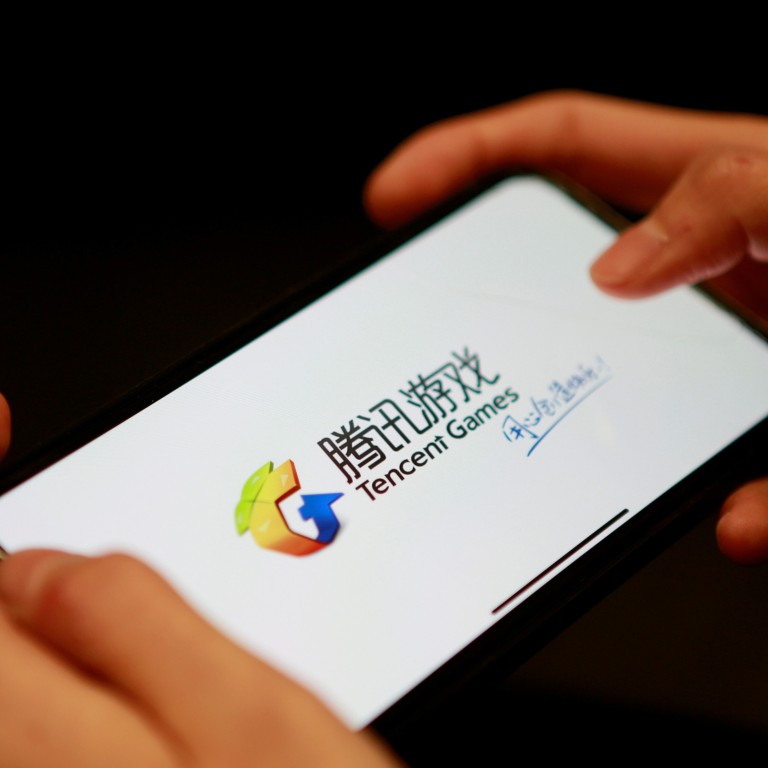
Tencent feels heat from gaming rivals Alibaba, ByteDance and Genshin Impact maker miHoYo
- Tencent saw record growth in gaming in 2020, investing in nearly 30 companies as PUBG Mobile and Honour of Kings pulled in more than US$5 billion
- While Alibaba and ByteDance continue to push into gaming, miHoYo’s Genshin Impact became one of the hottest new titles without Tencent’s ecosystem
Tencent Holdings, the world’s largest video games company by revenue, saw remarkable growth in 2020, but it now finds itself on the defensive, trying to tap into new gaming genres as large tech rivals and gaming upstarts chip away at its empire.
The Shenzhen-based company, which gets a third of its revenue from gaming, invested in 29 video game companies last year, three times more than in 2019. Tencent also pulled in more than US$2.6 billion from each of its two biggest mobile games, PUBG Mobile and Honour of Kings, a first for any gaming company, according to app tracking firm Sensor Tower.
Alibaba is the parent company of the South China Morning Post.
The success of Genshin Impact also represents a unique challenge for Tencent because miHoYo published and distributed the game itself through its website and various third-party platforms, largely bypassing Tencent’s ecosystem. The open-world action adventure game pulled in US$245 million in October and another US$148 million in November, averaging US$6 million every day, according to Sensor Tower.
“About 90 per cent of ad spend went to Bilibili and ByteDance’s platforms, and players can’t even download the game on Tencent’s MyApp store,” said Owen Soh, founder of EastLab Consulting. “The meteoric rise of smaller, non-Tencent backed studios focusing on niche genres such as miHoYo, HyperGryph and Papergames reveals that Tencent underestimated part of how the industry would evolve.”
Before Tencent’s Honour of Kings went viral, it was a desperate experiment
Tencent’s owes much of its success to its ability to monetise the users of its myriad platforms, including WeChat, China’s largest social network. Tapping into gaming early allowed the company to gain a foothold in the technological frontier of interactive media, generating troves of data used to train artificial intelligence.
The success of independent studios threatens this source of revenue. Tencent previously approached miHoYo for a stake in the company, but miHoYo declined despite being allowed to set the terms, according to Chinese media LatePost, an affiliate of business magazine Caijing.
“With Genshin Impact, miHoYo has set a major precedent: an independent Chinese studio can launch a global mega-hit from one day to the next, even without Tencent‘s help,” said Serkan Toto, CEO of game industry consultancy Kantan Games.
As gamers’ tastes continue to evolve, young start-ups like miHoYo, Lilith Games and HyperGryph have pushed their way up the gaming charts. In May 2018, titles from Tencent and NetEase made up eight of the top 10 games in China. By last September, the month Genshin Impact launched, that number had dropped to four.
“There are new genres of games that are becoming popular and monetisable that Tencent historically didn‘t focus on, but we can now focus on, and that represents new opportunities for us,” James Gordon Mitchell, Tencent’s chief strategy officer, said in an earnings call in November.
Genshin Impact wins best game accolade from Apple and Google
While trying to adapt, Tencent has also been fending off challenges from more deep-pocketed rivals.
Tencent has already moved to counter ByteDance’s rapid expansion in gaming. “Initiatives have already been implemented such as restrictions on the appearance of Tencent’s games on Douyin,” said Chundi Zhang, a gaming analyst with Ampere Analysis. Douyin is the Chinese version of TikTok.
Thanks to its tie-up with NetEase, Huawei is also poised to become a competitor in cloud gaming.
How ByteDance is copying Tencent’s playbook to conquer gaming
The increased competition from both new and entrenched players is what led Tencent to dial up its investment activities last year, according to Daniel Ahmad, senior analyst at market research firm Niko Partners.
“As Tencent faces increasing competition in the market, primarily from large tech firms such as ByteDance and Alibaba, in addition to mid-sized firms such as Lilith Games and miHoYo, the company appears to be taking a less conservative approach to mergers and acquisitions,” Ahmad said.
The company is also now investing in smaller companies than usual, and at earlier stages, he added.
Still, analysts agree that Tencent is not in danger of being dethroned any time soon.
Amid a global gaming boom during the Covid-19 pandemic last year, third-quarter revenue from Tencent’s online games business grew 45 per cent year on year, the fastest since the third quarter of 2017.
To hold its position, Tencent may continue to rely on investing in many different gaming companies this year, according to Zhang of Ampere Analysis. “It helps to ensure that the next game or company that has the potential to be successful will have a definite relationship with Tencent,” he said.

